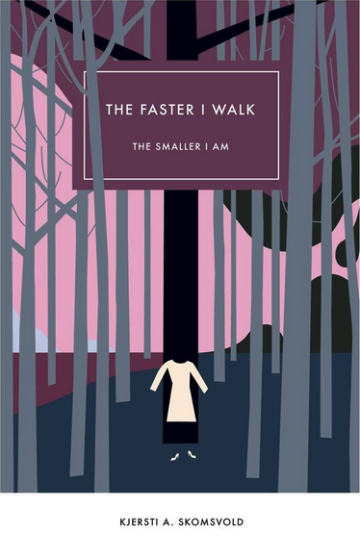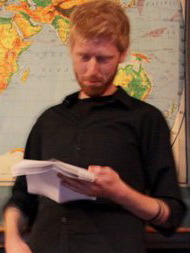THE FASTER I WALK, THE SMALLER I AM by Kjersti A. Skomsvold
“Why bother?” From the mouth of a stubborn pubescent, this question usually gets a smirk. However, in the case of Mathea Martinsen, the protagonist of Kjersti A. Skomsvold's touching and spare debut, THE FASTER I WALK, THE SMALLER I AM (published by Dalkey Archive Press, and translated by Kerri Pierce), it's a fair question. Not that the odds have ever been stacked against Mathea, nor has apathy ever been her thing. Since childhood, she has been idiosyncratic to the point of it being socially crippling. It didn't keep her from everything in life, though, as she did find a husband – named Epsilon – before settling down for an existence spent predominantly indoors in her native Norway. But now, the more obituaries the hermit reads about people younger than her, the more she's compelled to finally go outside and get known.
The trouble is that she has no idea how. Epsilon, himself not perfectly adjusted, but perhaps slightly more so given he held down a job for years, has passed away some time before the beginning of the novel, leaving Mathea's introverted perspective to subtly warp further. The reader who has coped at one time or another with their own social anxiety may cringe in recognition at what a big deal the most basic interactions are for Mathea, such this episode with a man from the area, who she comes across on her return from the market:
And suddenly, behind some bushes, I spot a pair of legs...I get the feeling he's been waiting for me. Perhaps he's from the nursing home next to the church....I want to turn around, but that would be too obvious, what if he gets offended? There's only one thing to do—keep walking, pretend everything's normal....When I'm only a couple of meters away, he looks right at me and I stop puffing, but keep on walking. “Excuse me,” he says, “do you have the time?” He says this like it's the most natural thing in the world, and perhaps it is, but I know nothing about the time. My watch is up in the attic along the almanac from my last year in school. “It's half past nine,” I say as I pass him, my legs keep moving along.” “Thank you,” he says. “No, thank you,” I say and the whole thing is over in seconds. My heart is beating so fast, it feels like it's ten meters in front of me, I just had a conversation, I just contributed to society...
In its brevity and clear symbolism, The Faster I Walk... is a kind of spiritual heir to Bohumil Hrabal's finale, Too Loud a Solitude. Where Hrabal aimed his beleaguered effervescence at the permanence of ideas, Skomsvold gently rolls an empathetic eye at the permanence of the individual – whether or not we are remembered by the world we leave behind when we pass away, and whether or not it matters. Granted a life longer and, on paper at least, emptier than most, the weightless burden becomes a bit much to bear as life's clock winds down. Our protagonist does make last-ditch attempts to establish herself in the physical world she shied away from. She even connects with the soil itself by burying her own personal version of a time capsule, though that time capsule is later unearthed when a flagpole is planted. If there's one element of the story that stumbles a bit in its otherwise graceful minuet through awkwardness, it is the possibility of Epsilon's infidelity. A common and pulling force of drama in most any other story, in this particular narrative it feels jarring. It tempers the fraught reverie of seeing the immediate world (we're talking about a Norwegian woman who starts to regret not taking that big trip to Copenhagen) through Mathea's eyes, an intruding presence of base behavior. In a life this allegorical, the stain of infidelity, in this case, doesn't so much ground the character as it does force a motive or a meaning where ambiguity might better suit.
But that's a quibble that The Faster I Walk... rises above. Placed alongside other literary debuts of the past year, this one stands out in its singular focus and unadorned prose, and its disinterest in (adultery aside) traditional devices. Let's shelve the cliche “luminous” and call this one, say, illuminating. Mathea is not the “everyman.” In fact, she's the opposite: the onlywoman. But we root for her, and feel with her, all the same.
Kjersti A. Skomsvold was born in 1979 in Oslo. The Faster I Walk, the Smaller I Am is her first novel, and won her the Tarjei Vesaas' Debutant Prize, was nominated to the Norwegian Booksellers' Prize, and has been translated into six languages.

